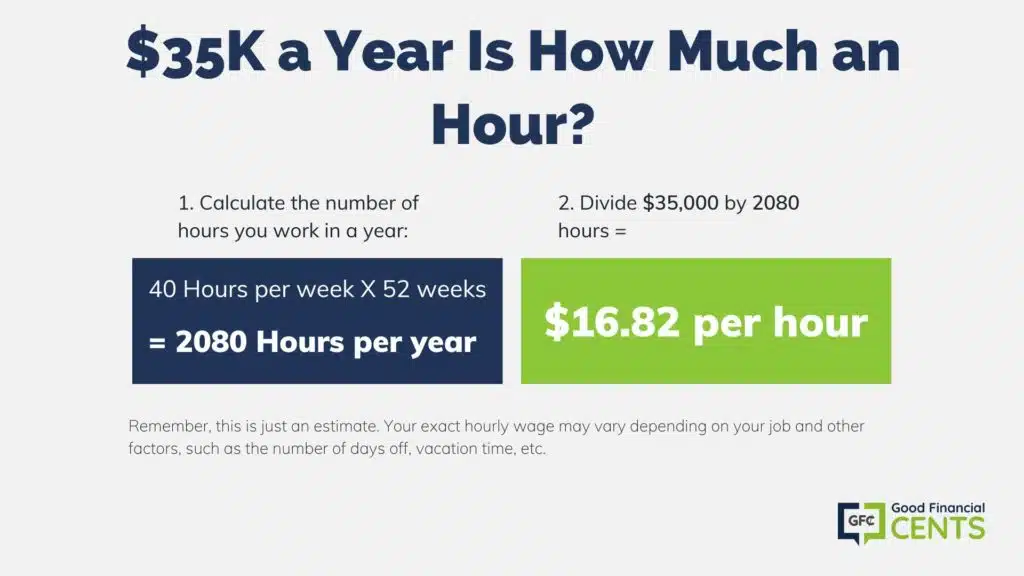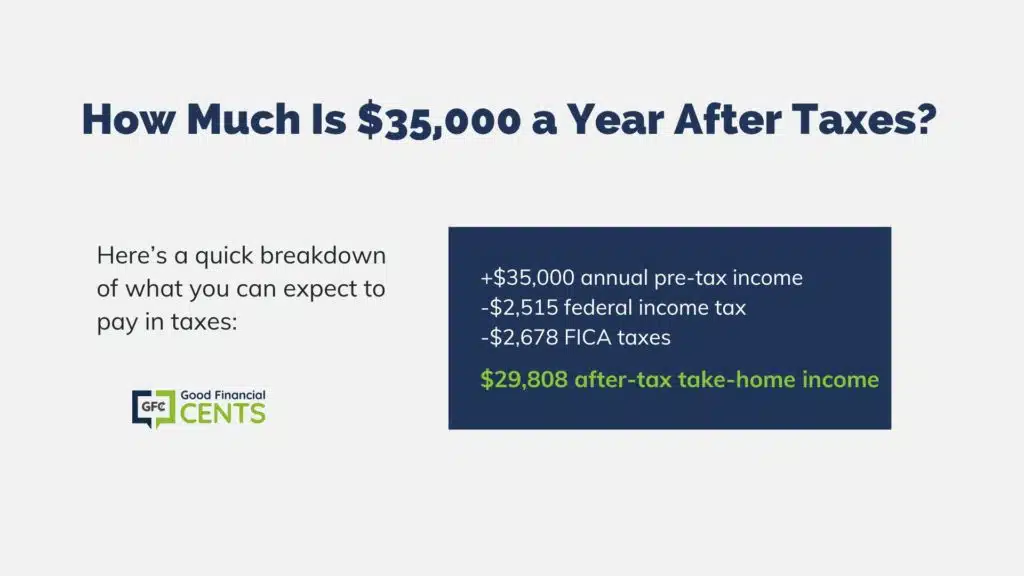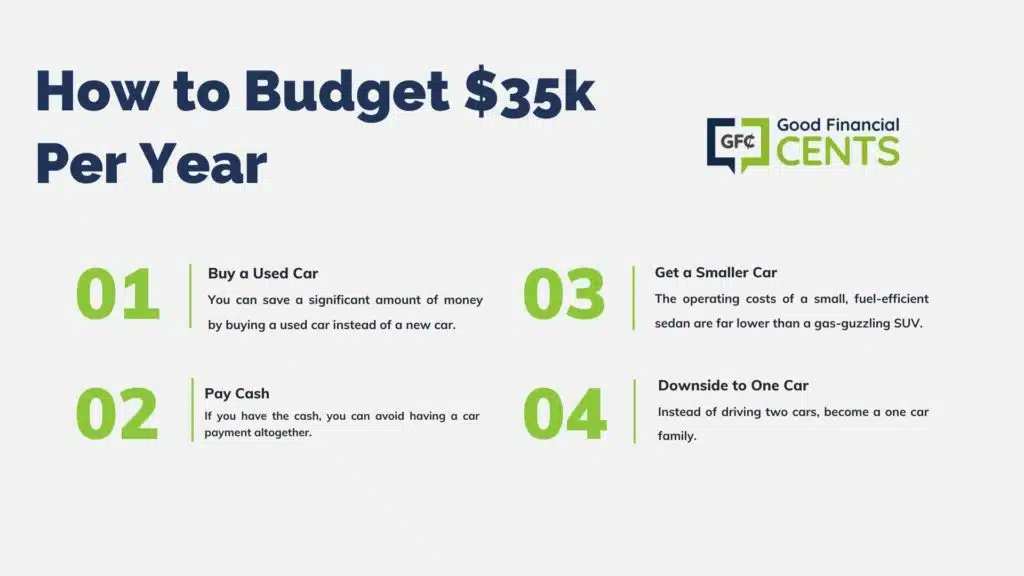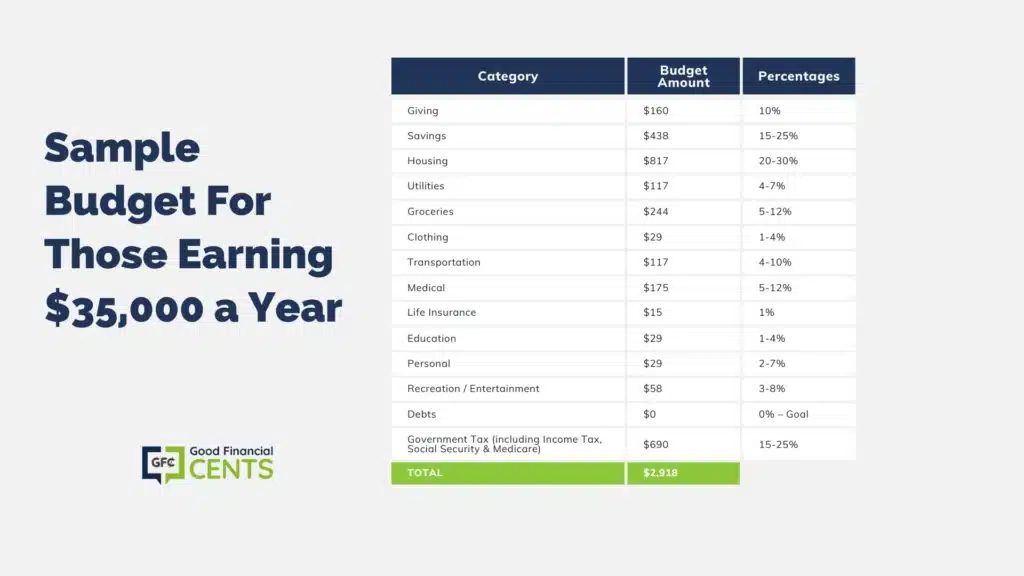As the cost of living continues to rise, many people find it difficult to make ends meet. A full-time job may not be enough to cover all one’s expenses, but it is still better than being unemployed.
If you’re being offered a job with an annual salary, you may be interested to know how your new income translates to an hourly wage.
By doing a simple calculation, it is possible to determine how much someone earns per hour. To illustrate, this blog post will explain the calculation using a $35,000 income, including how much you would make per hour, a sample budget, and more.
Table of Contents
- $35K a Year Is How Much an Hour?
- Calculate the number of hours you work in a year.
- How Does $35K a Year Compare?
- Is $35K a Year Worth Your Time?
- How to Make More While Working Less?
- What Is Your Paycheck if You Make $35K a Year?
- How Much is $17 an Hour Annually?
- How Does Vacation Impact My Annual Salary?
- How Much Is $35K a Year After Taxes?
- State By State $35K a Year Salary After Taxes in 2023
- What Types of Jobs Pay $35K Per Year?
- How to Budget $35K a Year?
- Sample Budget For Those Earning $35K a Year
- Final Thoughts on a 35K a Year Salary
$35K a Year Is How Much an Hour?
If you make $35,000 a year, you earn approximately $16.80 an hour. Here’s how the calculation works, based on a 40-hour work week.
Calculate the number of hours you work in a year.
40 Hours per week X 52 weeks = 2080 Hours per year
2. Divide $35,000 by 2080 hours = $16.82 per hour.
Remember, this is just an estimate. Your exact hourly wage may vary depending on your job and other factors, such as the number of days off, vacation time, etc.
An hourly rate of $16.82 is above the federal minimum wage of $7.25, although most state minimum wages are higher than that. Nevertheless, keep in mind that your hourly pay will be lower if you work more than 40 hours per week and higher if you work less.
For example, earning $35,000 a year but working 50 hours a week only translates to $13.46 per hour. On the flip side, if you earn 35k per year but only work 20 hours a week, your effective hourly rate climbs to $33.65.
You’ll still make the same amount of money, but the number of hours you work will differ.

How Does $35K a Year Compare?
Now that you know how much you would make an hour, it’s time to compare your salary to national and median household income statistics in the United States.
In July 2023, the national median household income was $82,139, an increase of 0.36% from the initial estimate of $81,843 in June 2023. So, $35,000 is roughly 57% less than the median.
However, the median income measures households, not individual earners. So if your family has more than one person working and earns a total of $82,000 a year, your family is making close to the median income in the United States.
No family of four can afford a decent quality of life in NYC on a yearly income of $27,750, let alone $35,000.
Is $16.82 a Good Hourly Rate?
The 2023 federal poverty level for a single individual without dependents is $14,580, while it’s $30,000 for a family of 4. In other words, according to federal poverty guidelines, a living wage that can support yourself and a small family is $14.42/hour (based on $30,000 yearly.)
But how realistic is that number? Depending on the cost of living where you live, a living wage is much, much higher. Take New York City, for example.
New York City’s cost of living is much higher than the national average. No family of four can afford a decent quality of life in NYC on a yearly income of $30,000, let alone $35,000. Therefore, it’s best to check where you live and research the area’s cost to determine if $35,000 is a livable salary.
Is $35K a Year Worth Your Time?
Single people living alone may find that $35,000 per year is more than enough to support themselves. However, they’ll need to be mindful of spending to save money or build up their retirement fund.
What is the opportunity cost of working a job that pays $35,000 a year? The opportunity cost is what you give up to do something. In this case, the opportunity cost is your time.
Some people may value their time more than others. For example, if you are a student, you may be willing to work a job that pays less because you gain valuable experience that will help you in your future career.
On the other hand, if you have a family to support, you may value your time because you must ensure that your family is taken care of.
Ultimately, it is up to you to decide if $35,000 a year is worth your time.
How to Make More While Working Less?
This is the dream for many people, but making more money while working less is possible. The key is to be productive with your time and use your skills to their fullest potential.
There are a few things you can try:
Invest in Passive Income Opportunities
One way to make more money is to reinvest part of your salary into a business or investment that will generate passive income. It will take time, but if you can do it effectively, it will be worth it in the long run.
Some examples of investments that generate passive income are:
Sell Your Services as a Freelancer
If you have certain skills, consider freelancing to increase your income. This is a great way to use your skills and talents to make extra cash. Another benefit of freelancing is that you can set your own hours and work as much or as little as you want.
Some examples of freelance work include:
- Graphic Design
- Web Design
- Editing
- Bookkeeping
Almost anything you are doing in your full-time job can be done freelance on the side.
Look for a Higher-Paying Job
If you are unhappy with your current salary, you can always look for a higher-paying job within the same company or elsewhere. Who knows, you may be able to make more money while working less.
The best way to find a higher-paying job is to network with people in your industry and to look for job postings online.
You could also consult a career coach to help you find a better-paying job.
Ask for a Raise
It would cost more money for your employer to replace you than to pay you a higher wage. Work hard and smart, and don’t be afraid to ask for a raise at your current job. The worst thing they can say is, “No.”
Be sure to consult with your boss to see if there are any opportunities for advancement at your company.
What Is Your Paycheck if You Make $35K a Year?
Let’s look at how a $35,000 annual salary looks on a paycheck by breaking it down biweekly and monthly.
Biweekly Pay
f you work 40 hours per week with no overtime in a full-time job, then $35,000 / 26 bi-weekly pay periods = $1,346.15 per paycheck. But that’s not what will appear in your bank account.
Take-Home Pay
Your take-home pay will be lower than your biweekly paycheck because of taxes and other deductions such as:
- Income taxes;
- Pre-tax deductions, including retirement accounts, health savings bank accounts, etc.;
- FICA (Social Security and Medicare) taxes;
- State and local taxes, if any;
- Miscellaneous employer deductions; and
Monthly Pay
If your salary is $35,000 annually, each paycheck would equal $2,916.67 before taxes and deductions. You may receive paid time off and federal holidays depending on your company. If this is the case, you’re effectively making more money per hour than your hourly rate suggests.
How Much is $17 an Hour Annually?
If you make $17 an hour, you make about $35,360 annually. But the above-mentioned figures are based on 40 hours weekly. If you work more than that, then you can make more money.
For example, if you work 50 hours a week, you will make $44,200 annually. If you work 60 hours a week, you will make $53,040 annually.
The salary will decrease if your working hours are less than 40 weekly.
For example, if you work 30 hours a week, you will make $26,520 annually. If you work 20 hours a week, you will make $17,680 annually.
This is why knowing how many hours you are expected to work is important if offered a job that pays $17 an hour.
How Does Vacation Impact My Annual Salary?
Everyone needs a break from work to recharge. What most people don’t realize is that vacation can have a direct impact on your salary.
When you take a vacation, you essentially take time off from work. This means that you are not working and not earning an income.
Your salary will not be reduced if you take paid vacation days as part of your employment contract. However, your salary may go down if you receive unpaid vacation days. Every company does things differently.
For example, bi-weekly pay cycles amount to $1346.15 annually for those earning $35,000. If someone in this income bracket took two weeks of unpaid vacation, their annual earnings would be lower by that same amount.
Remember that these examples only give you an idea of your salary, which will depend on other skills, experience, qualifications, and how many hours you plan to work.
How Much Is $35K a Year After Taxes?
Whatever your tax bracket is, you can expect to lose a chunk of your $35,000 salary to taxes. The amount you’ll pay in taxes depends on your filing status and how much money you make.
There are many moving parts regarding taxes, making it hard to advise without knowing complete details about your finances. However, here are some general things to keep in mind.
For example, say you live in Florida and make $35,000 a year.
Here’s a quick breakdown of what you can expect to pay in taxes:
- +$35,000 annual pre-tax income
- -$2,515 federal income tax
- -$2,678 FICA taxes
- $29,808 after-tax take-home income

State By State $35K a Year Salary After Taxes in 2023
Like their federal counterparts, each state and territory has tax brackets that are calculated similarly.
However, because each state or territory can set its own marginal tax rates and has different laws about what is and isn’t taxed, the amount of taxes you pay on $35,000 a year can vary based on your state or territory of residence.
The following table displays what your after-tax salary will be on a $35,000 salary for the 2023 tax year:
| State | After-Tax Net Salary |
|---|---|
| Alabama | $28,444.50 |
| Alaska | $30,004.50 |
| Arizona | $29,475.75 |
| Arkansas | $28,563.23 |
| California | $29,392.41 |
| Colorado | $29,073.90 |
| Connecticut | $28,454.50 |
| Delaware | $28,628.88 |
| District of Columbia | $28,935.50 |
| Florida | $30,004.50 |
| Georgia | $28,475.00 |
| Hawaii | $27,982.10 |
| Idaho | $28,777.80 |
| Illinois | $28,272.00 |
| Indiana | $28,902.00 |
| Iowa | $28,298.70 |
| Kansas | $28,666.50 |
| Kentucky | $28,554.15 |
| Louisiana | $30,004.50 |
| Maine | $28,777.80 |
| Maryland | $28,508.50 |
| Massachusetts | $28,254.50 |
| Michigan | $28,517.00 |
| Minnesota | $28,871.64 |
| Mississippi | $28,869.50 |
| Missouri | $29,127.41 |
| Montana | 28,671.95 |
| Nebraska | $29,018.19 |
| Nevada | $30,004.50 |
| New Hampshire | $30,004.50 |
| New Jersey | $29,462.00 |
| New Mexico | $29,247.65 |
| New York | $28,684.50 |
| North Carolina | $28,947.63 |
| North Dakota | $29,771.85 |
| Ohio | $29,757.03 |
| Oklahoma | $28,832.13 |
| Oregon | $27,454.94 |
| Pennsylvania | $28,930.00 |
| Rhode Island | $29,067.00 |
| South Carolina | $29,287.15 |
| South Dakota | $30,004.50 |
| Tennessee | $30,004.50 |
| Texas | $30,004.50 |
| Utah | $30,004.50 |
| Vermont | $29,049.75 |
| Virginia | $28,709.50 |
| Washington | $30,004.50 |
| West Virginia | $28,654.50 |
| Wisconsin | $29,123.63 |
| Wyoming | $30,004.50 |
Note: The figures above account for the federal and state taxes you’ll need to pay on an annual salary of $35,000 for the 2023 tax year in each of the 50 states and the FICA and Medicare contributions you’ll need to pay.
Source: World Salaries
What Types of Jobs Pay $35K Per Year?

Many jobs pay at least $35,000 per year and higher. Here are some examples:
- Survey researchers.
- Electro-mechanical and mechatronics technologists and technicians.
- Physical therapist assistants.
- Crane and tower operators.
- Property, real estate, and community association managers.
- Fundraisers.
- Legal support workers, all others.
- Tapers.
- Junior bank account cashier.
- Cardiovascular technologists and technicians.
- Flight attendants.
- Plant and system operators, all other.
- Telecommunications line installers and repairers.
- Sales representatives of services, except advertising, insurance, financial services, and travel.
- Property appraisers and assessors
The job list above is not all-inclusive, but it gives you a good idea of the positions offering an annual salary of $35,000+.
How to Budget $35K a Year?
The following budgeting tips can be helpful for any income. But for the purpose of this article, if you earn in the neighborhood of $35,000 a year, here are some ways to stretch your money further.
Cut Unnecessary Monthly Expenses
Whether you make $35,000 a year or $350,000 a year, it is important to live within your means. One of the best ways to do this is to cut unnecessary monthly expenses.
If you are unsure where to start, your budget is a good place to look. Are there any expenses that you can live without? If so, cut them from your budget and use them to pay down debt or build up your savings.
Here are some examples of expenses that you may be able to reduce or cut from your budget altogether:
- Cable TV
- Gym membership
- Eating out
- Clothes shopping
- Entertainment expenses
- Subscriptions (e.g., magazines, music, etc.)
- Travel expenses
Avoid High Car Payments
Unless you’ve saved a lot of cash, owning a new vehicle usually results in having a high car payment. According to Experian, the average monthly loan payment for a new car in the U.S. nearing $600 – which, for someone making $35,000 annually – is more than 20% of their monthly income.
This doesn’t even account for insurance, gas, and maintenance costs.
If you want to save money, one of the best things you can do is avoid having a big car payment. There are a few ways to do this, such as:
- Buy a used car: You can save a significant amount of money by buying a used car instead of a new car.
- Get a smaller car: The operating costs of a small, fuel-efficient sedan are far lower than a gas-guzzling SUV or pickup truck.
- Pay cash: If you have the cash, you can avoid having a car payment altogether.

Avoid Credit Card Debt
One trap that many people fall into is using credit cards to finance their lifestyle. Financially, it’s a dangerous proposition that can quickly lead to debt.
If you want to stay out of credit card debt, only use your credit cards for things you can afford to pay off in full each month. You need to re-evaluate your spending if you can’t afford to pay your credit card bill in full each month.
Sample Budget For Those Earning $35K a Year
By breaking down your monthly costs, it can be simpler to conceptualize living on a $35,000 salary. To help, here is a sample budget for an individual or family earning $35k annually.
| Category | Budget Amount | Percentages |
| Giving | $160 | 10% |
| Savings | $438 | 15-25% |
| Housing | $817 | 20-30% |
| Utilities | $117 | 4-7% |
| Groceries | $244 | 5-12% |
| Clothing | $29 | 1-4% |
| Transportation | $117 | 4-10% |
| Medical | $175 | 5-12% |
| Life Insurance | $15 | 1% |
| Education | $29 | 1-4% |
| Personal | $29 | 2-7% |
| Recreation / Entertainment | $58 | 3-8% |
| Debts | $0 | 0% – Goal |
| Government Tax (including Income Tax, Social Security & Medicare) | $690 | 15-25% |
| Total | $2,918 |
Note: This budget covers fixed expenses and assumes no debt.

Final Thoughts on a 35K a Year Salary
Salaries are highly relative because buying power varies greatly depending on where a person lives, as do lifestyle expectations.
In some parts of the world, a 35K yearly salary would be relatively low. In others, it would be considered an excellent salary. The same is true in the US.
For example, if you live in New York City, you must make nearly double that amount just to get by. In rural Mississippi, on the other hand, you could get by on $35,000 a year.
The key to surviving and thriving on a $35,000 salary is to live below your means, be mindful of your spending, and invest in yourself and your future.
Do you think you could live on a $ 35,000-a-year salary? Why or why not? Let us know in the comments below.








Leave a Reply